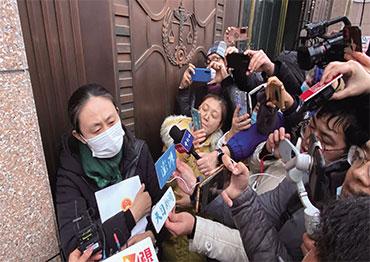The case has led to heated discussion in China. Many accused Liu of being selfish for locking her friend out and harboring a “cold-blooded” attitude toward both her friend’s death and her friend’s mother.
Others argue that Liu was also a victim who instinctively sought safety, and that Jiang Qiulian should not have appealed to the court of public opinion for a moral judgement against Liu, which has ruined Liu’s life.
In December 2017, Chen was convicted of murdering Jiang Ge in a Japanese court and received a 20-year sentence. But for Jiang Qiulian and many of China’s netizens, it did not provide closure.
The sentence fell short of what Jiang Qiulian expected. She had collected 1.5 million signatures on a petition from Chinese netizens calling to sentence Chen to death, but Liu’s evasiveness about how and why Jiang Ge was locked outside during her witness testimony led to widespread perception that the trial did not reveal the whole truth.
After returning to China, Jiang Qiulian continued to pursue Liu through social media posts, media interviews and lawyers, which led to what many called an “online lynching” of Liu. Over time, Liu became more hostile toward Jiang Qiulian. During the Lunar New Year holidays in 2018, a time when people send good wishes to family and friends, Liu sent a text message to Jiang Qiulian wishing her “a happy family reunion.”
In 2019, as Jiang Qiulian continued to fight for a court case in China, Liu sent her a number of abusive text messages. In a Weibo post in June 2019, Liu called Jiang Qiulian “an old bitch” and ridiculed Jiang’s exhaustion and frustration. “I have a lot of pictures of your daughter that you don’t have. Don’t you want to see them?” Liu wrote.
Four months later on October 2 during China’s National Day holiday, Liu posted on Weibo saying she would send some “not illegal but soul tormenting” gifts to Jiang Qiulian – “pigeon meat” and “duck neck.”
In Chinese, “pigeon” is pronounced ge, a homonym of her late friend’s first name. Her mention of “duck neck,” a delicacy in some provinces, is believed to refer to stab wounds on Jiang’s neck.
As the post infuriated the online community, Liu sent another text message to Jiang Qiulian. “Auntie, I can see that the publicity of your efforts is declining, so let me do you a favor,” Liu wrote. Liu’s messages and comments prompted a torrent of complaints, and Weibo later announced it was closing Liu’s account.
But not everyone stood with Jiang Qiulan. Some media reports described Jiang Qiulian’s attempts to sue Liu as a “moral witch hunt.” Others argued that Jiang Qiulian should move beyond her daughter’s death to live her own life instead of punishing Liu as a means to address her pain and grief.
On social media, rational discussion soon gave way to naming and shaming. As Liu also amassed a considerable number of staunch supporters, Jiang Qiulian was subject to constant abuse, questioned over her motives and accused of trying to profit from her daughter’s death.
Finally in December 2019, a court in Shandong decided to hear Jiang Qiulian’s case, under the principle of personal jurisdiction, which is the power of a country’s court to render a judgment concerning a country’s citizens, wherever they may be. Evidence obtained in Japan must be officially translated and notarized and once notarized, it can be accepted by a court in China.
Jiang Qiulian sought 2.07 million yuan (US$325,000) from Liu for violating her daughter’s right to life. The same month, Liu legally changed her name to Liu Nuanxi, possibly to escape the online abuse.

 Old Version
Old Version

